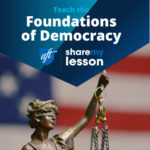This video playlist is part of the New-York Historical Society’s Academy for American Democracy, an educational initiative focusing on history and civics education for sixth grade students. Videos explore the ideals of democracy, civic participation, the evolution of Ancient Athenian and American democracy, and the power of the people within democracies.
What is a Democracy?
In this lesson, students will identify essential components of a functioning democracy. They will be presented with “borderline” countries – hypothetical nations that exhibit some, but not all, of the characteristics of a democracy. Through discussion and group work, students will expand their understanding of democracy and see different manifestations of democratic practices.
60-Second Civics Podcasts
60-Second Civics is a podcast that provides a quick and convenient way for listeners to learn about our nation’s government, the Constitution, and our history. The podcast explores themes related to civics and government, the constitutional issues behind the headlines, and the people and ideas that formed our nation’s history and government. The show’s content is primarily derived from the Center for Civic Education’s education for democracy curricula, including We the People: The Citizen and the Constitution, Foundations of Democracy, and Elements of Democracy. It’s easy to subscribe! Listen on iTunes or Stitcher or subscribe via RSS.
Foundations of Democracy
What are the three foundations of American democracy and how do they work together? Explore the National Constitution Center’s Foundations of Democracy learning module to uncover the connections between popular sovereignty, natural rights, and rule of law.
Founding Documents: Magna Carta Podcast
Magna Carta was sealed on a field in England in 1215. Its purpose was to appease some frustrated barons, and it was never intended to last. Over 800 years later, this document is credited with establishing one of the most foundational principles of our democracy. So what does Magna Carta actually say? And how did it get from dubious stalling tactic in the 13th century to Supreme Court arguments in the modern era?
In this episode, you’ll learn how Magna Carta survived and thrived its way into our democracy.
This short episode includes a one-page Graphic Organizer for students to take notes on while listening, as well as discussion questions on the back side.
Deliberation Materials: Is the United States’ Democracy Healthy?
Is the United States’ democracy healthy? This activity includes a deliberation reading and glossary, as well as accompanying handouts to give students additional information on the topic and to guide them through the deliberation process from planning to reflection. Deliberation teaches people how to discuss controversial issues by carefully considering multiple perspectives and searching for consensus. In preparation for deliberations, all participants read common, balanced background information on the issue. During the discourse, they offer arguments for each position on a contested public issue, first drawing from the text and then bringing in their own experiences.
Foundations of Democracy: Lesson Plans & Resources

This Share My Lesson collection provides teachers with free lesson plans and resources on the foundational principles of democracies, including rule of law, limited government, and checks and balances. It can be used to build background knowledge to analyze the health of our democracy over time and in today’s environment.
Strengthening Democracy in America
Strengthening Democracy in America is a collection of free courses featuring video interviews with noted scholars. These courses will deepen your understanding of the American political system and your rights and responsibilities in it. The first two courses provide a framework for understanding the history and development of the system. Subsequent courses focus on its strengths and weaknesses and means of enhancing the strengths and diminishing the weaknesses. The courses are open to anyone and can be completed at your own pace.
Birth of American Democracy: Discourse, Debate and Compromise
In this exploration of American democracy students will follow the path to representative government by analyzing the tradition of discourse, debate, and compromise from Jamestown to Williamsburg and Philadelphia and finally to Washington. Students will determine the importance of debate and compromise for the development of a government by and for the people and also identify strategies for making their voices heard in government today. Free registration required to access lesson plan.
Civic Education and Election Resources

It’s election season in the United States and a good time for students to understand why local and national politics matter and the core principles on how our democracy and elections works. What is gerrymandering? How can we strengthen our democracy? Plan how to answer questions like these as Election Day draws closer. Use these free K-12 civic education lessons, activities, blogs and webinars to help you educate students on the election and the importance of counting every vote. Additional topics include fostering civil discourse, fighting fake news, voting rights and debate ideas to keep your students informed and engaged.